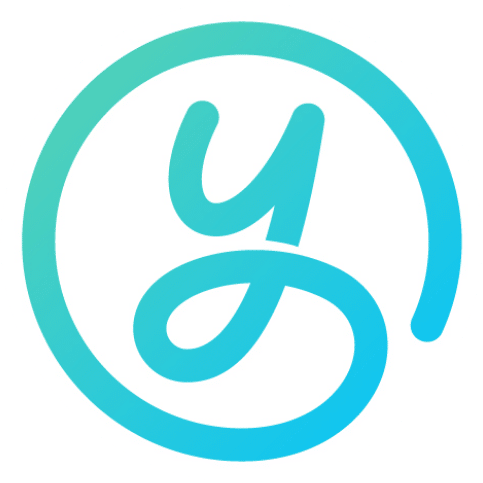If you’re looking for Waterloo Applicant Information Form (AIF) questions, examples, and prep tips, then you’ve come to the right place.
This Application Prep guide is fully updated with the 2023/2024 Waterloo AIF (i.e. for applicants planning on starting their program in Fall 2024).
Before you dive in, it’s important to understand that Waterloo admissions committees receive thousands of applications every year. To help you stand out from the crowd, you need to demonstrate a clear sense of self, strong life experience, and exemplary communication skills.
Our ‘full student’ coaching process will help you improve in all these areas (and more!).
If you’re not working with a coach, be sure to read the Self-Awareness, Goal-Setting, and Narrative Communication & Deductive Communication Skills Guides. All of these resources will empower you with the skills you need to show the admissions committee who you are, what you want to accomplish, and why you’d be a great fit for Waterloo.
COACH’S TIP: You can choose either of these communication styles for your AIF answers. Typically the Narrative Approach is for Arts/Business programs, or for questions where you want to tell a unique, authentic, and memorable story that creates an emotional connection with the reader. The Deductive Approach is typically used for STEM programs, where you have to provide an argument in a logical and structured way.
This is just a GUIDELINE so you can learn to communicate in a way that’s most familiar to you. Choose the approach that you’re most comfortable with (and get in touch with us if you need some help deciding which approach is best for you).
REMEMBER: There are some components of the AIF that are the same, regardless of the program you’re applying to, as well as program specific AIF sections. Make sure that you do your research and complete the entire AIF for your program.
All the examples are from the Waterloo Engineering, Waterloo AFM, and Waterloo Computer Science AIF. For program-specific guidance, connect with a coach any time for support.
Table of Contents
- Waterloo AIF Overview: What is the AIF?; Why do you need to write an AIF?; How is it evaluated?; How to use this guide; and More.
- Waterloo AIF, Section 1 – About You: Part A: Overview; AIF questions breakdown; templates; Examples; and More.
- Waterloo AIF, Section 2 – About You: Part B: Overview; AIF questions breakdown; templates; Examples; and More.
- Waterloo AIF, Section 3 – Courses: Overview; AIF questions breakdown; templates; Examples; and More.
2023-2024 Waterloo AIF Form Tips & Examples
What is the Waterloo AIF?
The Admissions Information Form (AIF) is an online form, typically with 3 or more sections with multiple short answer questions.
It takes the place of the traditional Personal Statement that other universities use.
The Waterloo AIF is mandatory for some programs and highly recommended for others.
The programs that require an AIF are:
- ALL programs in the Faculty of Engineering (click here for the full list of Engineering programs)
- ALL programs in the Faculty of Mathematics (click here for the full list of Math majors and programs)
- Architecture
- Computing and Financial Management
- Conditional admission to Pharmacy
- Optometry
- Pharmacy
REMEMBER: There are some components of the AIF that are the same, regardless of the program you’re applying to. There are also program specific AIF sections/questions (see those at the bottom of this page). These programs are: Engineering, Global Bus Digital Arts, Math Computer Science, CAP, Optometry, Pharmacy, and Social Work).
Before submitting your AIF, make sure that you do your research and complete the entire AIF for the program you’re applying to (or connect with us if you need some help).
The deadline for the Waterloo AIF is February 16, 2024 for all programs EXCEPT Optometry (deadline October 27, 2023 and Pharmacy (January 2024 – TBD). Make sure to check for other admission requirements (e.g. interview, transcripts, etc.) for your specific program.
To access your AIF, create an account in Quest and then log in to complete it before the deadline.
Why Do You Need to Submit the Waterloo AIF?
The Waterloo AIF is a way for programs at Waterloo to get a better sense of who you are beyond your grades.
Without it, you’re just a name on a page, and it’s really hard to differentiate you from other applicants, especially when everyone has good grades and is a competitive applicant.
This is why we HIGHLY recommend that you complete the AIF, even if it isn’t mandatory for the program.
The Waterloo AIF asks you to talk about things like your:
- Experiences
- Interests
- Skills
- Accomplishments
- Extracurriculars
- Goals
The admissions committee for the program you’re applying to uses all these details to see if you’d be a good fit for the program.
They’re looking to see if you have skills like communication, teamwork, problem solving, critical thinking, time management, and more — and they want to know about the experiences where you learned these skills. They want to figure out what makes you, you.
The AIF will help make your application more competitive (especially if your average is a bit lower) because you can emphasize the fact that you’re a well-rounded student who has the drive, skills, and passion to succeed in the program.
Put simply, the Waterloo AIF can mean the difference between acceptance and rejection.
That’s why we created this guide. Keep reading for a breakdown of the various sections of the AIF (non-program specific), as well as templates, examples, and prep tips.
How is the Waterloo AIF Evaluated?
We get a lot of questions about how the Waterloo AIF is used to evaluate applicants.
Every AIF is read by a team of reviewers, who are very familiar with the business/industry you’re applying to. For example, Waterloo Computer Science AIFs are evaluated by retired high school math teachers, and Waterloo Engineering uses program alumni to help them review.
Usually your personal information is removed, including your name, gender, location, school name, grades, etc. before the reviewers are given your AIF. This helps to ensure an impartial and completely objective evaluation.
Then, the reviewers read the AIF and give it a score, which is added to your admission average and other components of your application (e.g. video interview).
This score is then used to rank you against other applicants.
The grading rubric depends on the program you’re applying to, so if you want to learn more about this, we suggest that you connect with someone at the admissions office at Waterloo with your questions.
Usually you will be graded on things like: how well you communicate your skills, interests, accomplishments, experiences/extracurriculars, goals, commitment, and overall potential.
It’s key to get these things across on your Waterloo AIF (keep reading to learn how).
How to Use this Waterloo AIF Prep Guide
The Waterloo AIF typically has 4 main components if it’s mandatory, and 3 components if it’s recommended:
- About You: Part A
- About You: Part B
- Courses
- Program-Specific Section
In this guide, we will provide breakdowns, templates, and examples for Sections 1-3 (these are a bit more general and less program-specific).
IMPORTANT: If you don’t see all the questions in this guide, that doesn’t mean that you don’t have to complete them in your AIF. This guide is general, and some questions may be added to be a bit different depending on what you’re applying to. Make sure that you answer ALL questions in your AIF, even if they aren’t listed in this guide. For program-specific guidance, connect with a coach any time for support.
Some of the questions in AIF Sections 1-3 are optional and some are required. However, we suggest that you complete ALL of the questions and lists, even if they are optional.
As mentioned above, we will use AIF templates and examples from the Waterloo Engineering, Waterloo AFM, and Waterloo Computer Science AIF. You can also check out these guides for a complete breakdown of the entire AIF for those specific programs (including Section 4).
All our templates use our Narrative Communication & Deductive Communication Approaches, so you can see what an effective structure looks like for the answers. We will use both approaches throughout this guide.
You Might Also Like
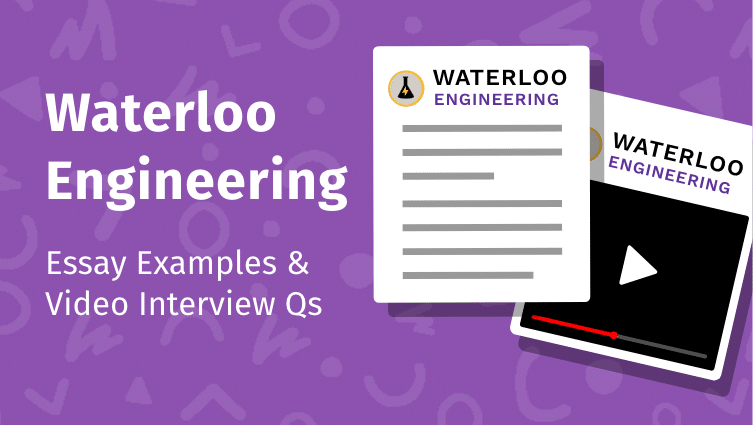
Application Prep
Waterloo Engineering Interview Questions & AIF Examples 2023/2024
If you are looking for Waterloo Engineering essay examples, video interview questions, and general guidance on the Admissions Information Form… Read more
Waterloo AIF Tips & Examples: Section 1: About You – Part A
AIF Section 1 asks you to describe your interest in the Waterloo program, as well as details about your extracurriculars and employment activities.
Here are the questions:
WATERLOO AIF SECTION 1, QUESTION 1 (REQUIRED ESSAY) – REASONS FOR CHOOSING WATERLOO
“Tell us about your education goals, your interest in your chosen program(s), and reasons for choosing to apply to the University of Waterloo. If you have applied to more than one program please discuss your interest in each program (maximum 900 characters).”
Waterloo AIF Breakdown – Reasons for Choosing Waterloo
This question is designed to help the admissions committee in the program you’re applying to get a better sense of who you are, where you come from, and where you want to go.
Seems pretty straightforward, right? Well guess what…they write the question like this on purpose!
Most applicants will give the same types of answers, listing their interest in a career in their particular area of interest and choosing Waterloo because it’s a top program in this field.
However, Waterloo wants to see applicants who have thought deeply about their goals, their future, and their interests beyond the surface level. Simply saying that you want to graduate and get hired straight out of school will not get you into the program. Instead, you need to come up with a few points that show your uniqueness and authenticity.
Luckily, you’ve already done most of the heavy lifting for the first part of this question (‘tell us about your education goals’) if you’ve completed Youthfully’s Student Identity Blueprint. When you did this, you worked with your coach to create audacious yet authentic goals based on your interests and aspirations, and you found ways to take them to the next level — and this is exactly what the Waterloo admissions committee wants to see in this section. If you haven’t completed your Blueprint yet, connect with a coach now.
For the second part of this question (‘your interest in your chosen program(s), and reasons for choosing to apply to the University of Waterloo’), do some research on EACH of the Waterloo programs you’re applying to specifically and the university as a whole.
See if there are specific professors, clubs, mission statements, courses, etc. that stick out to you, and discuss these for each of the programs you’re applying to. This will show that you have done your research and made an educated decision in choosing Waterloo, and that you have just as much to offer them as they will offer you.
Waterloo AIF Essay Template – Reasons for Choosing Waterloo
Get started with Youthfully’s FREE template doc has BOTH the Narrative Approach (starting on p.2) and Deductive Approach (starting on p.14) templates listed below.
REMEMBER: There is a 900 characters limit for this answer.
Here’s a template that follows our Narrative Communication Approach.
- Hook (Optional) (100 characters):
- Capture the reader’s attention and give a preview of what’s to come. Be specific to the program(s) you’re applying to as much as you can.
- Context/Catalyst (100-200 characters):
- Briefly state your education goals and your aspirations for the future and then talk about how you developed your interest in the field of interest (e.g. finance, accounting, engineering, pharmacology, etc.), and if there was a specific event or reason why you chose to apply to Waterloo.
- Outcome (200-300 characters):
- Explain why you want to explore and evolve your passion for the field you’re applying to and explain why Waterloo is that place for you to explore those interests. Provide specific examples if you can (e.g. specific clubs you want to join, professors you want to work with, a specific class you want to take, etc.). Do this for each of the programs you’re applying to.
- Reflection (200-300 characters)
- Write a few points about how your goals and interests make you a good fit for the program(s) and an asset to Waterloo more generally.
COACH’S TIP: Don’t worry about writing complete sentences in your template at first. Just write 2-3 bullet points under each section, just to get your ideas down. You can edit and perfect your answers later. If you’d like some more tips about writing these essays, check out our Narrative Communication Approach™ Guide.
Here’s a template that follows our Deductive Communication Approach:
- Waterloo Hypothesis/Answer & Main Reasons (100-200 characters)
- Answer the question, “Why Waterloo?”. Be specific to the university as much as you can. Briefly state your education goals and your aspirations for the future.
- Program Specific Hypothesis/Answer & Main Reasons (100-200 characters)
- Briefly state how the program you’re applying to at Waterloo is the only program that will help you reach these aspirations and goals, and describe what drew you to the program.
- Supporting Arguments (200-400 characters)
- Give some details as to why Waterloo (and the program(s) you’re applying to) is the best place for you to study, based on your interests, skills, and goals. Provide specific examples if you can (e.g. specific clubs you want to join, professors you want to work with, a specific class you want to take, etc.).
- So What? (200-300 characters)
- Write a few points about how your goals and interests make you a good fit for your program of choice and an asset to Waterloo more generally.
Waterloo AIF Examples – Reasons for Choosing Waterloo
Here are some examples of how to answer this question, using both of our communication approaches.
REMEMBER: This is an EXAMPLE ONLY and is NOT meant for you to copy. Why? First and foremost, this is plagiarism and is a serious offense. Plagiarizing these essays will result in immediate disqualification from the admissions process. This can be easily detected using technology and application reviewers are usually trained and/or able to spot when an application isn’t original and does not align with an applicant’s background, personality, values, etc.
Example 1: From the Waterloo AFM Program AIF, following the Narrative Communication Approach:
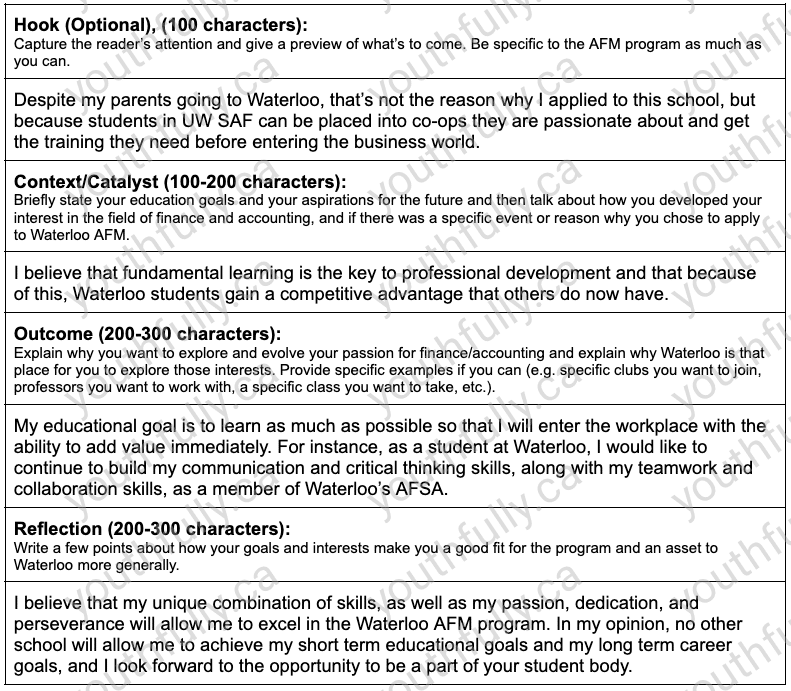
Example 2: For the Waterloo Computer Science Program AIF, following the Deductive Communication Approach:
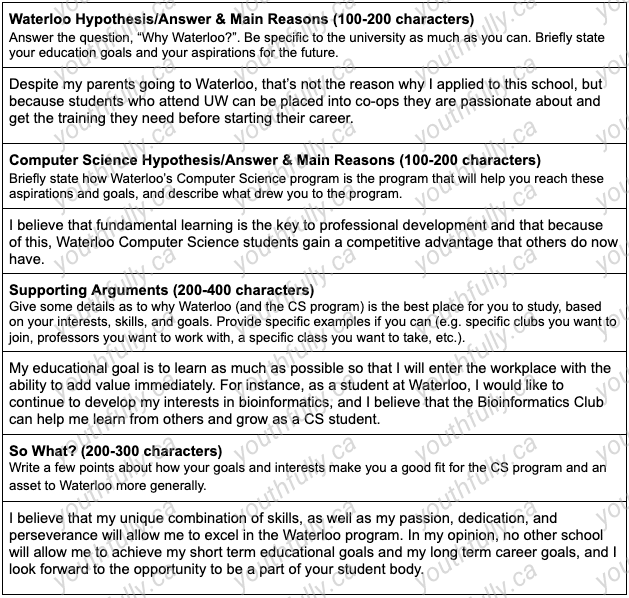
Want to see some more AIF examples for this question? Check out these Waterloo Engineering AIF examples.
WATERLOO AIF SECTION 1, QUESTION 2 (OPTIONAL LIST) – EXTRACURRICULAR ACTIVITIES
“Please list any extracurricular activities or areas of significant interest. These could include leadership or participation in school organizations or projects, athletics, travel, community, social activities, drama, music, clubs, personal hobbies and/or significant volunteer work.”
Waterloo AIF Template – Extracurricular Activities
This section is one of the easier ones to complete. Simply fill in the:
- Activity Type: Athletics, clubs, community work, drama, hobbies, music, other, project, school organization, social activity, travel, or volunteer
- Description/Title (40 characters or less)
- Start Date (month/day/year)
- End Date (month/day/year)
- Whether you did this activity in Grade 10, 11, or 12
- Hours per week
- Weeks per year
Waterloo AIF Example – Extracurricular Activities
Here’s an example of how this section might look:
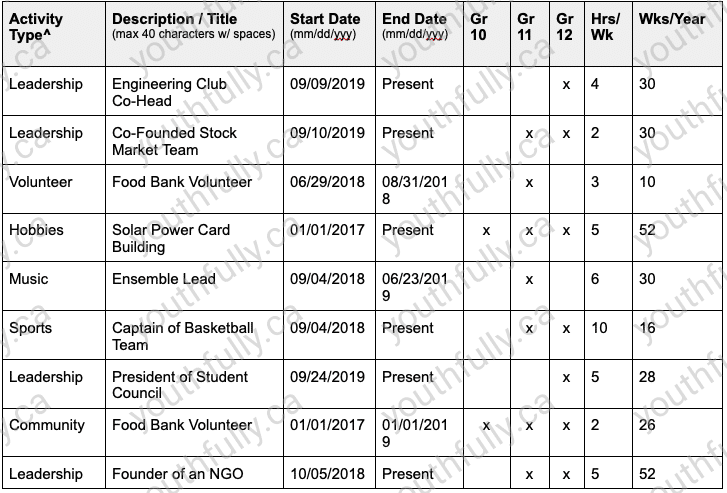
Do you have a bunch of extracurriculars and you’re not sure which to include? Connect with a coach for help.
You Might Also Like
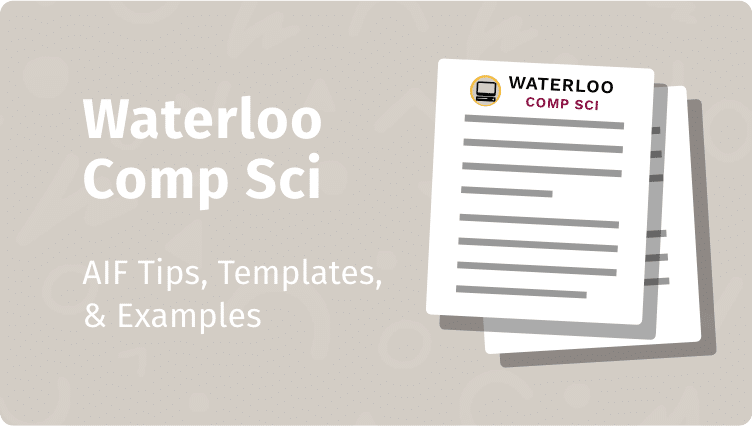
Application Prep
Computer Science Waterloo University: AIF Tips & Examples 2023/2024
If you are looking for guidance, examples, and prep tips for the University of Waterloo’s Applicant Information Form (AIF) for… Read more
WATERLOO AIF SECTION 1, QUESTION 3 (OPTIONAL, BUT RECOMMENDED ESSAY) – EXTRACURRICULAR ACTIVITIES: ADDITIONAL INFORMATION
“Provide any additional information about anything in the table above. (600 character limit)”
Waterloo AIF Essay Question Breakdown – Extracurriculars: Additional Information
This question gives you the opportunity to provide more information about the ECs you listed in Question 2.
We highly recommend completing this section because it will allow you to give the admissions committee some personal insight, like who you are, what you’re interested in, what experiences you’ve had, and what you care about. All of this is key if you want your application to stand out.
COACH’S TIP: You only get 600 characters (including spaces) for this question. When writing your essay, focus on your extracurriculars as a whole, and briefly reference 1-2 specific activities as examples. Looking at the big picture (i.e. what you learned, skills you gained, passions you developed, etc.) will show your purpose for taking part in these extracurriculars and how you grew as a person by doing them.
Use this section to focus on the impact your extracurriculars have had on you, what you’ve accomplished, and what you’ve learned along the way. Focus on traits that Waterloo looks for, like being a leader and innovator or being organized and able to manage your time. Drive home the idea that you have real-world skills and that you are using the extracurricular activities as a way to set specific goals that will help you have a positive impact on the world both now and in the future.
Waterloo AIF Essay Template – Extracurriculars: Additional Information
Get started with Youthfully’s FREE template doc has BOTH the Narrative Approach (starting on p.2) and Deductive Approach (starting on p.14) templates listed below.
REMEMBER: There is a 600 characters limit for this answer. Your answer should be ONE PARAGRAPH in the end.
Here’s a template that follows our Narrative Communication Approach:
- Hook (~100 characters)
- Think of the Hook like a ‘pitch’ in this example. Provide a quick high-level pitch of how your extracurriculars have made you a better applicant.
- Context/Catalyst (~350 characters)
- Mention any quantifiable or significant outcomes from your extracurriculars. Do this for your most impactful extracurriculars.
- Outcome/Reflection (~150 characters)
- Describe what this means to your candidacy (i.e. how does it make you a better applicant and a great fit for the Waterloo program you’re applying to?)
Here’s a template that follows our Deductive Communication Approach:
- The Pitch (~100 characters)
- Think of the Hook like a ‘pitch’ in this example. Provide a quick high-level pitch of how your extracurriculars have made you a better applicant.
- Details (~350 characters)
- Mention any quantifiable or significant outcomes from your extracurriculars (i.e. hours spent, money raised, etc.). Do this for your most impactful ECs.
- So What? (~150 characters)
- Describe what this means to your candidacy (i.e. how does it make you a better applicant for a great fit for the Waterloo program you’re applying to?).
COACH’S TIP: Use the structure below to develop ONE PARAGRAPH paragraph highlighting your best extracurricular achievements. Make sure to demonstrate problem solving, time management, leadership, and commitment within each.
Waterloo AIF Essay Example – Extracurriculars: Additional Information
Here are some examples of how to answer this question, using both of our communication approaches.
REMEMBER: Please note that all of the examples in this guide are EXAMPLES ONLY and are NOT meant for you to copy.
Example 1: From the Waterloo AFM Program AIF, following the Narrative Communication Approach:
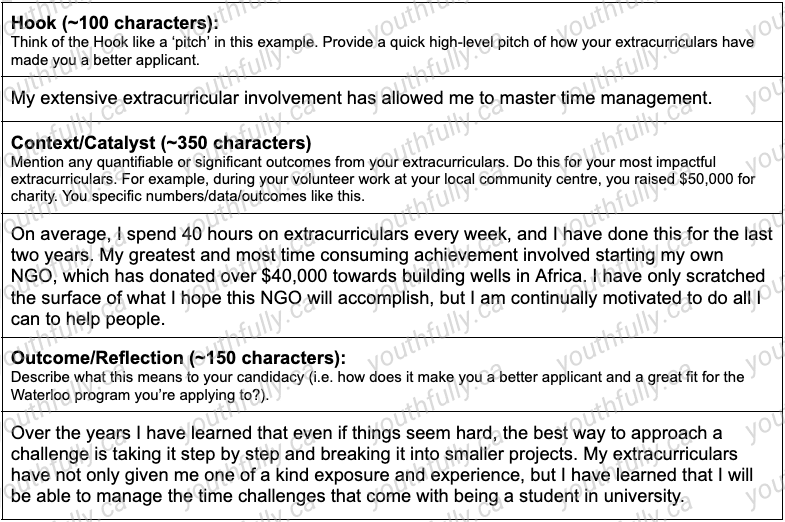
Example 2: For the Waterloo Engineering Program AIF, following the Deductive Communication Approach:
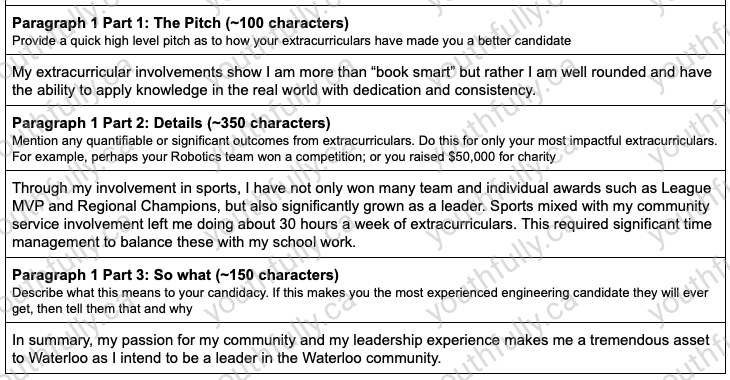
Want to see some more examples for this AIF question? Check out our Waterloo Computer Science App Prep Guide and Waterloo Engineering App Prep Guide.
Need some help choosing which extracurricular activity to focus on and writing a standout Waterloo AIF answer? We can help! 🙂
WATERLOO AIF SECTION 1, QUESTION 4 (REQUIRED LIST) – EMPLOYMENT
“Please list your most significant part-time or full-time employment in the past 2 years, beginning with the most recent.”
If you have been away from school or university for more than two years, you can send a current resume to myapplication@waterloo.ca (make sure to include your Waterloo ID#).
Waterloo AIF Template – Employment Background
Enter your employment experience in reverse chronological order (i.e. your older experiences at the bottom and your most recent at the top).
Fill in these components:
- Employer (max 30 characters with spaces)
- Description/Title (max 50 characters with spaces)
- Brief description of work/your role (max 254 characters with spaces)
- Hours of work per week
- Start date
- End date
Waterloo AIF Example – Employment
Here’s an example of what this section might look like:

WATERLOO SECTION 1, QUESTION 5 (REQUIRED LIST) – SPECIAL ACHIEVEMENTS, DISTINCTIONS, AND AWARDS
“If you have received any academic or non-academic awards or distinctions, please list them below. Please provide the Size of Competition if you know how many people participated.”
Waterloo AIF Template – Special Achievements, Distinctions, and Awards
Enter your special achievements/awards/distinctions in reverse chronological order (i.e. your older experiences at the bottom, and your most recent at the top.
Fill in these components:
- Award Type (i.e. academic or non-academic)
- Award, honour, or distinction type/name (254 characters with spaces)
- Year you received it
- Size of the competition (i.e. how many people you competed against/how big the applicant pool was)
Waterloo AIF Example – Special Achievements, Distinctions, and Awards
Here’s a Waterloo Essay Example of what this section might look like:

Ace your Waterloo AIF.
get a youth coach™Alex
Waterloo AIF
Expert &
Youth Coach™

Waterloo AIF Tips & Examples: Section 2: About You – Part B
This section of the Waterloo AIF asks you to describe your prior education, and you’ll have the opportunity to discuss any relevant outside circumstances or additional personal information.
IMPORTANT: If you’re completing the Waterloo Engineering AIF, there’s an optional essay question at the beginning of AIF Section 2, About You Part B that asks you to discuss any issues or circumstances that might have affected your academic record. Click here for the breakdown, template, and example for that question if you see it on your AIF.
WATERLOO AIF, SECTION 2, QUESTION 1 (REQUIRED ANSWER) – INSTITUTION(S) ATTENDED
“The name and location of the secondary or post-secondary school(s) you are now attending or have attended should be listed below. Are any secondary or post-secondary schools missing from the list? If yes, please add them in the space below.”
Simply select your Institution as it appears on the list. Answer ‘Yes’ if an institution is missing from the list, and then write it in the space provided. If your institution appears on the list, select ‘No’ and do not write anything in the box provided.
WATERLOO AIF SECTION 2, QUESTION 2 (REQUIRED ANSWER) – POST-SECONDARY EDUCATION
“Have you taken or are you currently taking courses at a college or university?
Simply answer ‘Yes’ or ‘No’.
If you answer ‘Yes’, give the name of the college or university, the start and end dates of your studies there, and the number of courses you took. You are required to submit all official final college or university transcripts.”
WATERLOO AIF SECTION 2, QUESTION 3 (OPTIONAL, BUT RECOMMENDED ESSAY) – ADDITIONAL INFORMATION
“In addition to the specific information requested in all of the AIF questions, please tell us anything else about yourself that you would like us to know when we review your application.
Please make sure to complete all sections of the AIF before submitting this page. (900 character limit)”
Waterloo AIF Essay Question Breakdown – Additional Information
Think of this essay as your chance to sell yourself to the admissions committee, focusing on why you should be accepted to the program you’re applying to.
There are thousands of applicants — what makes YOU different?
Is there a certain trait that you’re known for, like your unwillingness to give up, your epic accounting skills, or your ability to see the world in a unique way? That trait is exactly what you should focus on here.
Digging deeper into this will drive home the point that you are different from other applicants and that the admissions committee would be crazy not to let you in to the program(s) you’re applying to.
Using this essay to explore differentiating traits will also show that you have self-awareness and have an interest in constantly improving. If you’ve filled out our Student Identity Blueprint, then you probably have a pretty good idea about all the cool things that make you, you — and now it’s time to share them (keep reading to learn how). If you haven’t filled out your Blueprint, connect with a coach to get started.
Waterloo AIF Essay Template – Additional Information
Get started on Youthfully’s FREE template doc has BOTH the Narrative Approach (starting on p.2) and Deductive Approach (starting on p.14) templates listed below.
REMEMBER: There is a 900 characters limit for this answer.
We designed this template so that you can choose one thing that differentiates you from everyone else, like your creativity, perseverance, or your wide range of experiences, which are all things that the admissions committee looks for.
Here’s a template that follows our Narrative Communication Approach:
- Hook/Context (~150 characters)
- List 1-2 facts about you that will help you stand out from other candidates.
- Catalyst/Outcome (~350 characters)
- Describe to them how you would describe yourself. Make it personable and unique. Was there something specific that impacted who you are (like an experience, upbringing, circumstance, etc.)? What would the admissions committee be surprised to learn about you?
- Reflection (~400 characters)
- Describe how who you are makes you not just a good fit, but also a good asset to Waterloo. Remember: you want to go there, but they want to attract the best students. Tell them why you are the best student. Finish by providing a brief explanation for why you are the best and will succeed at Waterloo. Make this explicit and catchy.
Here’s a template that follows our Deductive Communication Approach:
- Hypothesis/Answer (~250 characters)
- List 1-2 things that differentiate you from everyone else. Think outside the box to help you stand out from other candidates.
- Main Reason(s) & Supporting Arguments (~350 characters)
- Imagine you’re someone else…now describe yourself. Be personable and unique. Was there something specific that impacted who you are (like an experience, upbringing, circumstance, etc.)? What would the admissions committee be surprised to learn about you?
- So What? (~300 characters)
- Describe how who you are makes you not just a good fit, but also a good asset to Waterloo. Remember: you want to go there, but they want to attract the best students. Tell them why you are the best student. Finish by providing a brief explanation for why you are the best and will succeed at Waterloo. Make this explicit and catchy.
Not sure which differentiator(s) to focus on? Connect with a coach to choose the best one.
Waterloo AIF Essay Question Example – Additional Information
Here are some examples of how to answer this question, using both of our communication approaches.
REMEMBER: This is an EXAMPLE ONLY and is NOT meant for you to copy. Why? First and foremost, this is plagiarism and is a serious offense. Plagiarizing these essays will result in immediate disqualification from the admissions process. This can be easily detected using technology and application reviewers are usually trained and/or able to spot when an application isn’t original and does not align with an applicant’s background, personality, values, etc.
Example 1: From the Waterloo AFM AIF, following the Narrative Communication Approach:
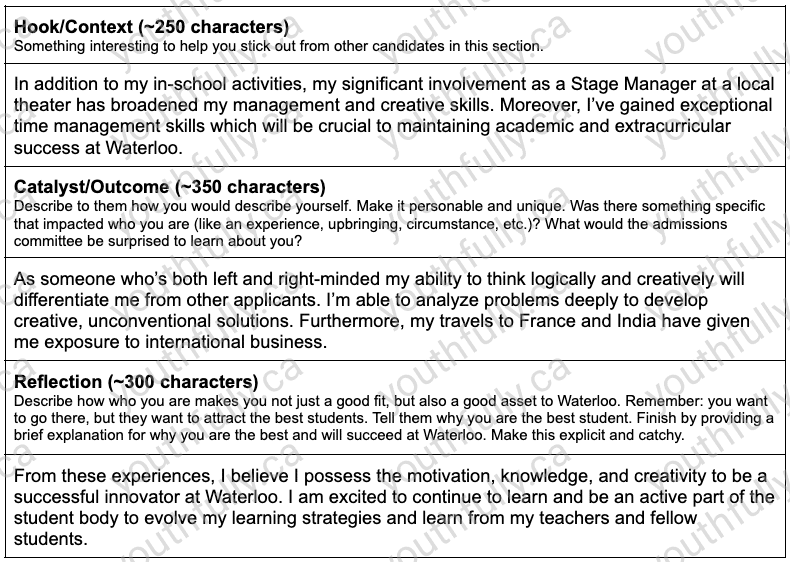
Want more examples for this question? Check them out here.
Example 2: For the Waterloo Computer Science AIF, following the Deductive Communication Approach. You’ll notice that these this essay has the same content as the one above, just communicated a bit differently depending on the Narrative/Deductive style:
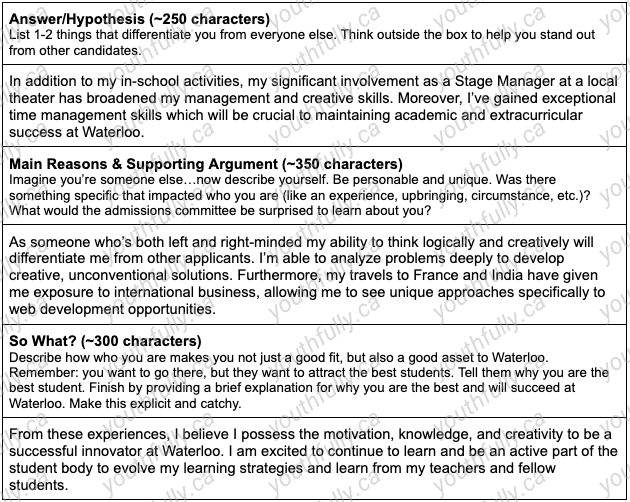
For more examples, go to our Waterloo Computer Science App Prep Guide.
You Might Also Like
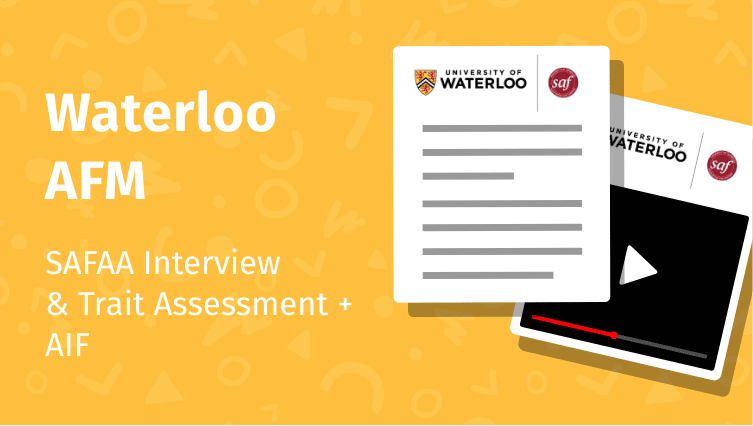
Application Prep
Waterloo SAFAA (AFM): Interview Examples & Trait Assessment PLUS Waterloo AIF Examples 2023/2024
If you are looking for guidance, examples, and prep tips for the University of Waterloo’s School of Accounting and Finance… Read more
Waterloo AIF Tips & Examples: Section 3 – Courses
This section focuses on the coursework you’ve completed in school, as well as additional outside courses.
WATERLOO AIF SECTION 3, QUESTION 1 (REQUIRED LIST) – CURRENT COURSES
“List your current courses and courses that you will complete by the end of the academic year.”
COACH’S TIP: There are specific instructions for Ontario students, students outside of Ontario, and all students, so make sure you read the instructions carefully to ensure you’re giving the correct information. Also, do not try to convert your grades from 1-100 (e.g. 91%). AP uses grading from 1-5, so under “level” list AP and then put the actual grade in the course mark section.
If you need help with this section, connect with a coach for support.
Waterloo AIF Template – Current Courses
You are required to list the following information:
- Course name
- Level
- Scool
- Completion Date (if incomplete, write IP)
- Whether you added this course as (if applicable)
- Night School
- Summer School
- Saturday School
- Distance Education/Online
- Repeated
- Course mark
Waterloo AIF Example – Current Courses
Here’s an example of what this section might look like:

WATERLOO AIF SECTION 3, QUESTION 2 (OPTIONAL LIST) – PRIOR COURSES
“List all the courses you’ve taken in Grades 9-11.”
Waterloo AIF Template – Courses Prior to Fall 2022
You are required to list the following information:
- Course name
- Level
- Scool
- Completion Date
- Whether you added this course as (if applicable)
- Night School
- Summer School
- Saturday School
- Distance Education/Online
- Repeated
- Course mark
COACH’S TIP: Just like in Question 1, make sure you read the instructions carefully for Ontario students, students outside of Ontario, and all students.
WATERLOO AIF SECTION 3, QUESTION 3 (OPTIONAL ESSAY) – ADDITIONAL COURSE INFORMATION
“If you are not attending high school, CEGEP, or equivalent, list courses relevant to our admission requirements for the program(s) you applied to. Please explain your background in this section. (900 character limit)”
Waterloo AIF Essay Question Breakdown – Additional Course Information
This essay does not need to be extremely detailed, but it is meant to provide the admissions committee with a brief explanation about additional courses you’ve completed and why you completed them.
Answer these questions in your essay:
- What were the additional courses?
- When did you take this course?
- Why did you take this course?
- What was the outcome?
- How will it help you at Waterloo (optional)?
Do this for every course that falls into this category, making a separate paragraph for each, for a total of 900 characters.
Waterloo AIF Template – Additional Courses Information
Get started with Youthfully’s FREE AIF template.
Complete this section if you took courses outside of high school that weren’t repeated or upgrade courses.
We designed this template in a way that will help you organize your thoughts and give the necessary background for each course, so that you can easily turn it into an essay.
You’ll see sections for: When, Course Name, and Background.
Add bullet points in each section, and when you’re done, take out the bullet points and make complete sentences for a complete essay. It’s that easy!
Waterloo AIF Example – Additional Courses Information
Here’s an example of this question using the template, and then easily turning it into an essay:

Here’s an example of an essay from the above example:
In the summer of 2017 after I graduated high school, I took a C++ course. We never had a specific C++ class in high school, however, I wanted to broaden my skills and therefore while I was out of high school, I took a C++ course that I believe will assist me in Software Engineering at Waterloo.
Moreover, in the fall of 2017 while I was working, I took a computer engineering class. Although there was a computer engineering class in high school, since it was not a requirement for any programs, I did not take it. Now that I want to attend Systems Design Engineering, I believe this will be a valuable class to take.
WATERLOO AIF SECTION 3, QUESTION 4 (OPTIONAL ESSAY) – COURSES NOT TAKEN AT YOUR REGULAR DAY SCHOOL
“Please provide a reason why any Grade 12 (or equivalent) courses listed above were not taken at your regular day school. (900 character limit)”
Waterloo AIF Essay Question Breakdown – Courses Not Taken at Your Regular Day School
This essay does not need to be extremely detailed, but it is meant to provide the admissions committee with a brief explanation about courses you’ve completed outside of regular school and why.
Answer these questions in your essay:
- What was the course?
- When did you take this course?
- Why did you take this course?
- What was the outcome?
- How will it help you at Waterloo (optional)?
Do this for every course that falls into this category, making a separate paragraph for each.
Waterloo AIF Essay Template – Courses Not Taken at Your Regular Day School
Get started with Youthfully’s FREE AIF template.
If you checked “Night School”, “Summer School”, “Saturday School”, or “Distance Education/Online” for any courses in Question 1 and/or Question 2, explain why you took those courses here.
Like Question 3, we’ve created a template that will help you create bullet points under “Course Name” and “Explanation” for each course, and then use that to easily create an essay afterwards.
Do this for every course that falls into this category.
Waterloo AIF Example – Courses Not Taken at Your Regular Day School
Here’s an example of this question using the template, and then easily turning it into an essay:

Here’s an example of an essay from the above example:
I took ENG4U in summer school. As a result of playing Junior Hockey, my workload during the school year is intense. As a result, I need to take courses in the summer to balance the workload during the school year. Even though I am taking one less class during the year, I still have an above workload during the year as a result of hockey.
WATERLOO SECTION 3, QUESTION 5 (OPTIONAL ESSAY) – REPEATED COURSES
“Please provide a reason why any Grade 12 (or equivalent) courses listed above were repeated. (900 character limit)”
Waterloo AIF Essay Question Breakdown – Repeated Courses
This essay does not need to be extremely detailed, but it is meant to provide the admissions committee with a brief explanation about courses you’ve had to redo and why.
Answer these questions in your essay:
- What was the course?
- When did you take this course?
- Why did you have to take this course again?
- What was the outcome?
Do this for every course that falls into this category, making a separate paragraph for each.
Waterloo AIF Essay Template – Repeated Courses
Get started with Youthfully’s FREE AIF template.
If you took a class again, like Grade 12 Math or English, explain why you did that here.
REMEMBER: If you repeat a required course, Waterloo will either take the original grade OR the new grade, and then deduct 5 points off that. For example, if you got an 80 the first time you took Grade 12 Math and then you took it again and got a 90, Waterloo will record it as an 85. If it is not a required course, there will be no adjustment.
Use this template for every course that falls into this category.
- Course name (<5 words):
- List the full course name and the course code.
- When You Took It (<10 words):
- Write when you took the course.
- Why Did You Take The Course Again? (<40 words):
- Explain the circumstances that caused you to retake the course.
- What Was the Outcome? (<45 words):
- Talk about what happened when you took it again (i.e. whether you passed/failed taking it again, the grade you got when you retook it, etc.)
You can write bullet points under each of these components, then simply remove the bullets to create complete sentences when you’re done.
Waterloo AIF Example – Repeated Courses
Here’s a Waterloo essay example of this question using the template:
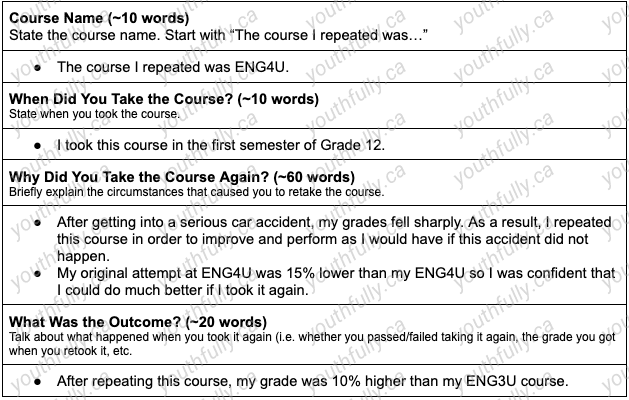
WATERLOO AIF SECTION 3, QUESTION 6 (OPTIONAL ESSAY) – UPGRADING
“If you have been out of school and are in the process of refreshing your academic skills for admission to the University of Waterloo, such as by taking pre-university-level mathematics courses, please list the course(s) below. (600 character limit)”
Waterloo AIF Essay Question Breakdown – Upgrading
This essay does not need to be extremely detailed, but it is meant to provide the admissions committee with a brief explanation about courses you’ve had to redo and why.
Answer these questions in your essay:
- What was the course?
- When did you take this course?
- Why didn’t you complete this course previously?
- What was the outcome?
Do this for every course that falls into this category, making a separate paragraph for each.
If you have the character space, briefly emphasize your passion for the program you’re applying to. Showing willingness to upgrade so that you can pursue a degree in your chosen field will showcase your passion, dedication, and interest in this field.
Waterloo AIF Essay Template – Upgrading
Get started with Youthfully’s FREE AIF template.
Like Question 5, we’ve created a template that will help you create bullet points under “Course Name” and “Explanation” for each course, and then use that to easily create an essay afterwards.
Do this for every course that falls into this category.
Waterloo AIF Example – Upgrading
Here’s an example of this question using the template, and then easily turning it into an essay:

Here’s a Waterloo sample of an essay from the above example:
After graduating high school, I took MHF4U at an adult high school. Originally when I graduated high school, I wanted to go into Political Science and therefore I did not require this course. However, I have since realized that my passion lies in computer science so I took MHF4U in order to be a strong applicant for the CS program at Waterloo.
If you are unsure about what category your courses fall under for Questions 3-6, or you’re unsure about how to create simple and informative essays to explain each course, connect with a coach for help.
***DON’T FORGET: Although we’ve covered Sections 1-3 in this guide, the program you’re applying to (e.g. Engineering, AFM, Computer Science, etc.) might have a program-specific Section 4. Make sure you complete the ENTIRE AIF before submitting it!***
Find the mentor you’ve been looking for.
get a youth coach™
You’ve Got a Dedicated Coach in Your Corner
For over a decade, we have worked with thousands of students to help them achieve more than they ever thought possible.
Our coaches have a strong success rate supporting students as they apply to the University of Waterloo, among other top universities.
Our 1-on-1 Youth Coaching fills that gap that most high schools miss. We can help you build self-awareness through probing questions and assessments, set bigger goals to elevate your extracurriculars and future career plans, and improve skills that matter on supplementary applications, such as interviewing, written communication, critical thinking, and creativity.
We use a coaching methodology, called ‘full student’ development, that’s been proven to increase your chances of admission to top-tier universities and obtaining competitive jobs/internships.
So, what are you waiting for? Fulfill your post-secondary potential with the mentorship and coaching you’ve always wanted!
IMPORTANT: Want to share information and/or images from this resource on your own website, blog, article, etc.? Please ensure you reference content of any kind published by Youthfully Inc., in whole or in part, using the following statement: (1) Our Organization (Youthfully Inc.); (2) The title of our content/resource; and (3) the URL to our webpage where the content was originally posted. For example: “Sourced from: Youthfully Inc., “University of Waterloo: AIF Tips, Questions & Examples”, https://youthfully.ca/waterloo-aif-tips-example-sample-answers.” Not doing so is an infringement of copyright and is illegal. We spend significant time developing resources for students, so please take a few seconds to ensure they are referenced properly.
DISCLAIMER: While the information in this blog is considered to be true and correct at the date of publication, and although our team makes every attempt to ensure that the information is accurate and vetted by university staff, Youthfully is not in any way liable for the accuracy of any information printed and stored or in any way interpreted and used by a user.
AIF Section 1: About You, Part A
AIF Section 2: About You, Part B
AIF Section 3: Courses
Get 1-on-1 Support

